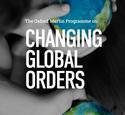Beyond ‘Following the Experts’: Technocrats and Multilateralism
At a time when we need them the most, international organizations are struggling to prove their worth. Eyebrows were raised when the COP28 climate change conference last year was presided over by Sultan al-Jaber, the CEO of the Abu Dhabi National Oil Company. The United Nations (UN) has been taking a vocal stance on the devastating war in Gaza, but as a result the Israeli government expressed a desire to ‘teach the UN a lesson.’ Paralysed by Russian veto-power, the Organisation for Security and Co-operation in Europe (OSCE) is facing an existential crisis. Expansion of the BRICS (Brazil, Russia, India, China, and South Africa) is seen as empowering for countries in the Global South, but it also parallels a waning commitment to existing international institutions with universal membership. And of course, during the Covid-19 pandemic the world’s wealthiest nations ignored efforts by the World Health Organization (WHO) to coordinate the distribution of vaccines. Multilateralism may not be ‘on its deathbed,’ as some have argued, but it is clear that it is due for an update.
Even if several international institutions may have ‘made it through’ the turbulent early 2020s ‘in pretty good shape,’ as Richard Gowan of the Crisis Group claims, UN agencies have been unable as yet to restore trust and legitimacy. Last summer, the UN reported that during the Covid-19 pandemic the IMF allocated $280 billion in drawing rights to G7 countries (with a population of 772 million people), compared to about $8 billion to low-income countries (with a population of 1.1 billion people). Meanwhile the UN’s ‘broadest and most ambitious collective action aimed at development,’ Brazil’s president Lula argued with reference to the Agenda 2030 for Sustainable Development at the UN General Assembly in September, ‘could turn into its biggest failure.’
According to UN Secretary-General António Guterres, major reform is needed since ‘global governance is stuck in time’: existing institutions reflect the world as it was in 1945, not as it is today. Yet as policy-makers pursue much-needed improvements, they must be cautious not to strengthen institutional capacity at the expense of further undermining the system’s already fragile legitimacy.
A prime example of this is the increasing reliance on expertise. Despite its central role to international organisations, parts of the public claim that these organisations hide behind a veil of technicalities to promote unwanted interference. Others point to the authority of specialists and their role in helping international organisations address complex issues such as climate change. And yes, complex problems do require specialist analysis and understanding – experts are absolutely essential. But that does not mean that solving global political problems is as straightforward as ‘following the science,’ as Greta Thunberg famously declared. In the face of political pushback, technocratic rhetoric often falls flat, and it risks further undermining public support for international organisations. Based on my research on their technocratic legacies, let me briefly explore where this potentially self-undermining tendency might come from.
Technocratic by design?
If global governance is ‘stuck in time,’ as the UN Secretary-General claims, then its technocratic foundations are an all too often overlooked part of the problem. Historians have long been working on the history of expertise. From Paul Gordon Lauren’s 1976 Diplomats and Bureaucrats, to Joseph Morgan Hodge’s 2007 Triumph of the Expert, to our co-director Patricia Clavin’s 2013 Securing the World Economy, to Susan Pedersen’s 2017 The Guardians — these works all include in-depth, critical studies of different kinds of expert and their historical roles in shaping foreign policy and international organisations. International relations scholars in turn are also paying increasing attention to expertise, if not typically in historical perspective. Dialogue between history and international relations — a central commitment of the Oxford Martin Programme on Changing Global Orders — is essential if we want to better understand the topic and connect historical insight to present-day challenges.
Well before the establishment of the UN system in 1945, international organisations were envisioned as institutions where experts held a central role. The first modern international organisations were set up in the nineteenth century as technical bodies by internationalist pioneers with a strong faith in technical and scientific experts – whether lawyers or economists, medics or engineers. Science was, in the minds of these early institution-builders, a universal language: the ideal foundation for harmonising global order. This was the universalism of white European men, for the most part, but the claim was a long-standing one.
The idea of a separate international realm, having gained currency once the British legal and political philosopher Jeremy Bentham had coined the term ‘international’ in 1780, had technical connotations from the start. Initially thought of as a legal term – ‘international law,’ Bentham proposed, was a more convenient shorthand for the ‘law of nations’ – the concept was gradually applied to other technical contexts as well.
According to the Oxford English Dictionary, its first compounds included ‘international correspondence’ (1807), ‘international commerce’ (1811), ‘international copyright’ (1833), ‘international ports’ (1848), ‘international code’ (1855), and ‘international units’ of measurement (1857). During the mid-nineteenth century, international commissions – again driven by the mobilisation of experts – emerged to coordinate and accommodate a growing number of transnational enterprises.
Actors from different political persuasions aimed to transcend power politics by advocating for a sphere where ‘progress beyond borders’ did not depend on political licence alone. For feminists and socialists, sometimes equally wedded to technocratic thought, this was about forging transnational bonds of solidarity and resistance; for the protagonists of globalising capitalism, it could be a strategy to leapfrog or circumvent governmental oversight. Over the course of the nineteenth century, the latter group populated their vision of the ‘international’ with technical commissions such as the 1855 Suez Canal Commission or the 1865 Cape Spartel Lighthouse Commission. They all pursued international cooperation by getting the relevant experts on board.
As I show in an article about the Suez Canal Commission, relying on experts strengthened them but also made them vulnerable. Expertise supported the Commission to the extent that it brought much-needed engineering and geological knowledge to the table. But it was also used to side-line and distract from deeper political issues, such as land ownership or sovereignty, leaving the question unresolved. The public international unions – the 1865 International Telegraph Union and the 1874 Universal Postal Union, respectively – further institutionalised this expertise practice. Over the long run, this design preference inspired the predecessors of today’s international organisations.
By the early twentieth century, a self-understanding and professional identity of the international civil servant as an impartial, technically competent actor emerged. To cultivate a distinctive ‘international mind,’ in the words of the right-wing internationalist Nicholas Murray Butler, was about impartiality and absolute objectivity. It also relied on a preference for evidence-gathering over argument or conviction.
History can hardly ever be reduced to simple lessons, nor should it be. But a key point from the above is this: expertise and a technocratic style both shaped international organisations as we know them, and with it our expectations. We expect international organisations to follow the expertise – and for some this is their greatest strength, whereas others attack this as unaccountable technocratic power. Yet in fact, historically and at present, international organisations do not merely ‘follow the experts’: they select them, sometimes strategically use them, and sometimes disregard their judgements. To get out of endless debates about pro-expertise versus anti-expertise, then, we need to think about other sources of legitimacy.
The legitimacy challenge
Historically, then, a self-understanding centred on expert-centred governance practices has been crucial to the work of international organisations. But critics insist that these organisations obscure their politics through layers of technicalities to promote controversial economic and political interventions. This critique was at the heart of debates on shock therapy in 1980s Latin America and 1990s East and Southeast Asia; it was voiced again at the 1999 Seattle protests against the WTO; and more recently it was repurposed by the Brexit campaign and Covid-19 denialism targeting the WHO. Whatever we may think of such pushback – if we want to take contestation more seriously, improving institutional resilience must go beyond getting more specialists on board, whether through ad-hoc committees, expert panels, or consultancies.
At heart, the challenge for international organisations is to strengthen sources of legitimacy other than expertise. Generally speaking, legitimacy refers to the consent of the governed to a particular political authority. Max Weber’s classic typology distinguishes between three forms: traditional, charismatic, and rational-legal legitimacy. Variation between these depends on the question: what shared belief or agreed-upon principle confers authority upon a given governing body or person, leading the governed to consent to the exercise of said authority?
IR scholars such as Michael Barnett and Martha Finnemore adopt Weber’s categories to make sense of how governments, non-state actors, but also publics ‘buy into’ the authority of particular governance institutions. Their underlying question is: what gives international organisation A or B the right to claim authority over issue-area X or Y? Of course, determining the consent of the governed is much more intractable in the case of such organisations. Not only does the public not elect their staff – very often they even exercise authority over non-constituencies: think of the IMF imposing austerity on indebted nations. In those cases, controversy over international organisations erupts and publics demand to know: who are you to tell us how to tackle this problem?
Often the answer has been technocratic in kind: international civil servants have tended to restate their technical credential as the basis of their political authority. This gets us to the heart of the technocracy problem: technocratic arguments privilege efficiency over legitimacy, while critics – whether being Seattle’s activists protesting the WTO or Brexit supporters – prioritise the latter. They argue that highly efficient policy-making does not automatically produce equitable, fair, or otherwise ‘good’ outcomes. Such are the stakes of the global governance legitimacy crisis.
Protracted, complex challenges such as climate change, pandemics, war, and the turbulent intersections between them, all call for more expertise. Experts greatly help international governmental and non-governmental organisations to better understand the issues they face: whether climate change, energy security, pandemics, or AI – to know what exactly the main challenges and policy options are in each of these issue areas, we simply depend on input from researchers and those with first-hand experience. Still, to simply point out this much and leave it at that is unhelpful. Organisations also need public support, which hinges on political mechanisms such as burden distribution, fair representation, and holding the powerful accountable. No amount of expertise can definitively settle these questions.
Yes, the track record of many international organisations may seem disappointing. But that is no reason to resort to cynicism about their weakness in a supposed world of raw power politics. International organisations still retain potential as sites of solidarity and accountability. As such, they will be essential for facing future global shocks: to hold the fossil-fuel industry accountable and redistribute climate change burdens; to make AI not just more ethical but mitigate the excessive environmental costs of running data centres; or to hold to account and punish war crimes and genocide. Empirically examining as well as theorising the place of public contestation is one crucial step towards reimagining their legitimacy – and, perhaps, towards avoiding the next anti-expert backlash.

|
| Jan Eijking is an Oxford Martin Fellow at the Changing Global Orders programme. His work focuses on the role of technical experts within international organisations. He is currently writing a book, based on his doctoral thesis, on expert-based international governance in the nineteenth century. |




